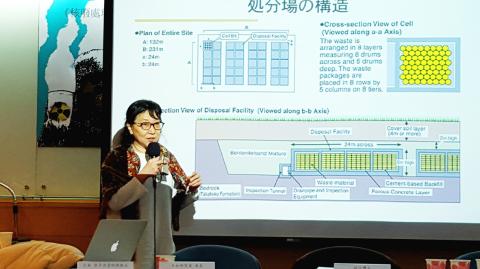Japanese nuclear waste management specialist Masako Sawai yesterday identified flaws in Taiwan Power Co’s (Taipower) nuclear waste management, describing the contingent measures at the Guosheng Nuclear Power Plant in New Taipei City’s Wanli District (萬里) and a radioactive waste repository on Orchid Island (Lanyu, 蘭嶼) in Taitung County as “ill-planned and careless.”
Sawai, a member of Japan’s Citizens’ Nuclear Information Center, spoke at a forum in Taipei to conclude her three-day visit to look into nuclear facilities and exchange opinions with local experts.
After visiting the Guosheng plant, she said that the methods utilized by Taipower to incinerate low-level radioactive waste were outdated and poorly managed.

Photo: Chen Wei-han, Taipei Times
The purpose of incinerating radioactive waste is to reduce waste volume, Sawai said, adding that using a plasma torch is the common incineration method around the world, as it generates temperatures of up to 15,000oC to melt mixed waste materials into liquid for storage as high-level radioactive waste, she said.
However, according to former Institute of Nuclear Energy Research researcher He Li-wei (賀立維), the Guosheng plant and the Ma-anshan Nuclear Power Plant in Pingtung County are equipped with diesel-fueled incinerators commonly used to burn general household waste.
Diesel-fueled incinerators can only reach temperatures of 800oC to 1,000oC and are not capable of melting nuclear waste, leading to the generation of ash and emission of airborne, radioactive residues, Sawai said.
“Higher background radiation levels in the greater Taipei area could reasonably be attributed to two nuclear plants in New Taipei City and the incineration of radioactive waste if there is no other nuclear facilities in the area. Incineration does not reduce radioactivity of waste, so power companies have to ensure that radioactive emissions are captured,” she said.
Sawai called on Taipower to conduct radioactivity tests of nuclear waste both before and after incineration to assess radiation leakage.
According to He, Taipower officials gave contradictory answers when asked if the company conducted radioactivity testing before incineration, either saying they did not know what was going on or trying to withhold information.
“Even if Taiwan shifts to a plasma torch incineration method, there will not be improvement with such careless management of nuclear waste,” Sawai said.
Meanwhile, a reservoir built above the Guosheng plant is not placed high enough to pump water into the plant’s reactors using the force of gravity during a nuclear accident if electrical power is cut, she said, adding that the water taken from a nearby brook might contain sulphur, which would react inside reactors and cause risks.
Sawai said that in Japan, low-level radioactive waste is stored in iron drums that are buried 20m underground and surrounded by reinforced concrete walls, which is “unlike the careless treatment at Orchid Island,” where damaged drums were discovered in a 3m deep repository.
It is not uncommon around the world to neglect the danger of low-level radioactive waste and store different types of nuclear waste together, although the half-lives of some nuclear waste is more than 1,000 years, easily outlasting the storage facilities they are kept in, Sawai said, calling on Taiwanese authorities to handle the issue properly.

An essay competition jointly organized by a local writing society and a publisher affiliated with the Chinese Communist Party (CCP) might have contravened the Act Governing Relations Between the People of the Taiwan Area and the Mainland Area (臺灣地區與大陸地區人民關係條例), the Mainland Affairs Council (MAC) said on Thursday. “In this case, the partner organization is clearly an agency under the CCP’s Fujian Provincial Committee,” MAC Deputy Minister and spokesperson Liang Wen-chieh (梁文傑) said at a news briefing in Taipei. “It also involves bringing Taiwanese students to China with all-expenses-paid arrangements to attend award ceremonies and camps,” Liang said. Those two “characteristics” are typically sufficient

The brilliant blue waters, thick foliage and bucolic atmosphere on this seemingly idyllic archipelago deep in the Pacific Ocean belie the key role it now plays in a titanic geopolitical struggle. Palau is again on the front line as China, and the US and its allies prepare their forces in an intensifying contest for control over the Asia-Pacific region. The democratic nation of just 17,000 people hosts US-controlled airstrips and soon-to-be-completed radar installations that the US military describes as “critical” to monitoring vast swathes of water and airspace. It is also a key piece of the second island chain, a string of

A magnitude 5.9 earthquake that struck about 33km off the coast of Hualien City was the "main shock" in a series of quakes in the area, with aftershocks expected over the next three days, the Central Weather Administration (CWA) said yesterday. Prior to the magnitude 5.9 quake shaking most of Taiwan at 6:53pm yesterday, six other earthquakes stronger than a magnitude of 4, starting with a magnitude 5.5 quake at 6:09pm, occurred in the area. CWA Seismological Center Director Wu Chien-fu (吳健富) confirmed that the quakes were all part of the same series and that the magnitude 5.5 temblor was

The Central Weather Administration has issued a heat alert for southeastern Taiwan, warning of temperatures as high as 36°C today, while alerting some coastal areas of strong winds later in the day. Kaohsiung’s Neimen District (內門) and Pingtung County’s Neipu Township (內埔) are under an orange heat alert, which warns of temperatures as high as 36°C for three consecutive days, the CWA said, citing southwest winds. The heat would also extend to Tainan’s Nansi (楠西) and Yujing (玉井) districts, as well as Pingtung’s Gaoshu (高樹), Yanpu (鹽埔) and Majia (瑪家) townships, it said, forecasting highs of up to 36°C in those areas